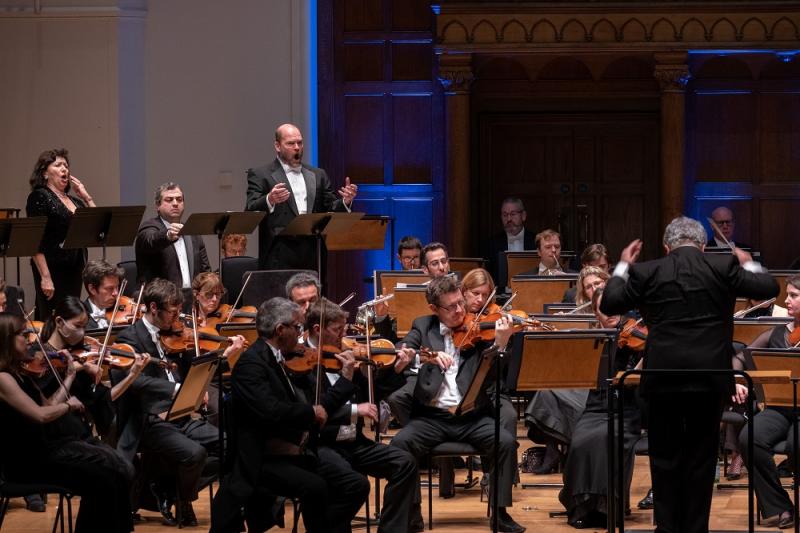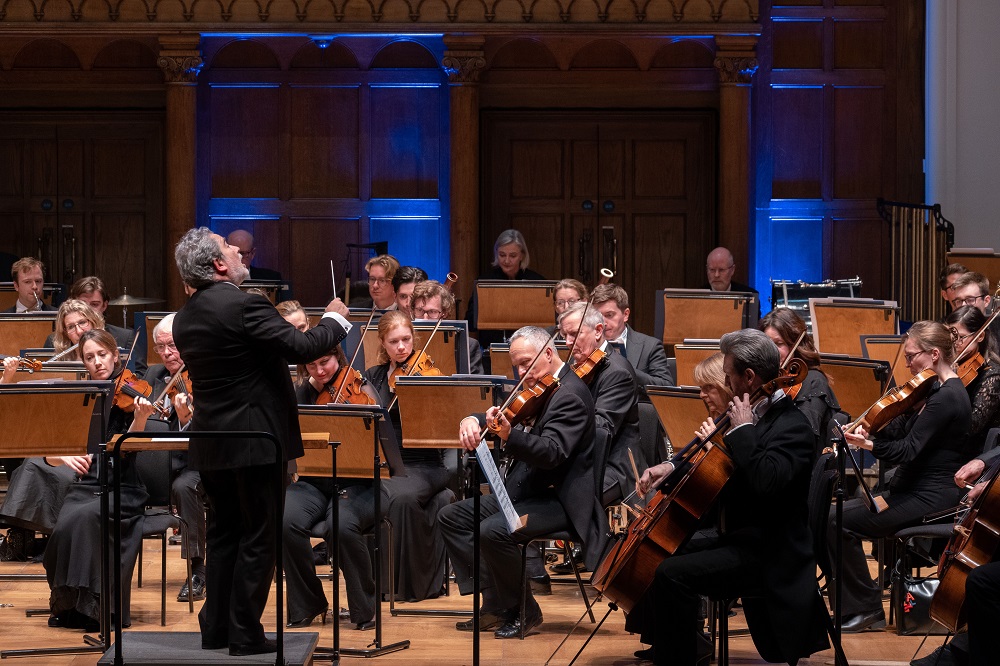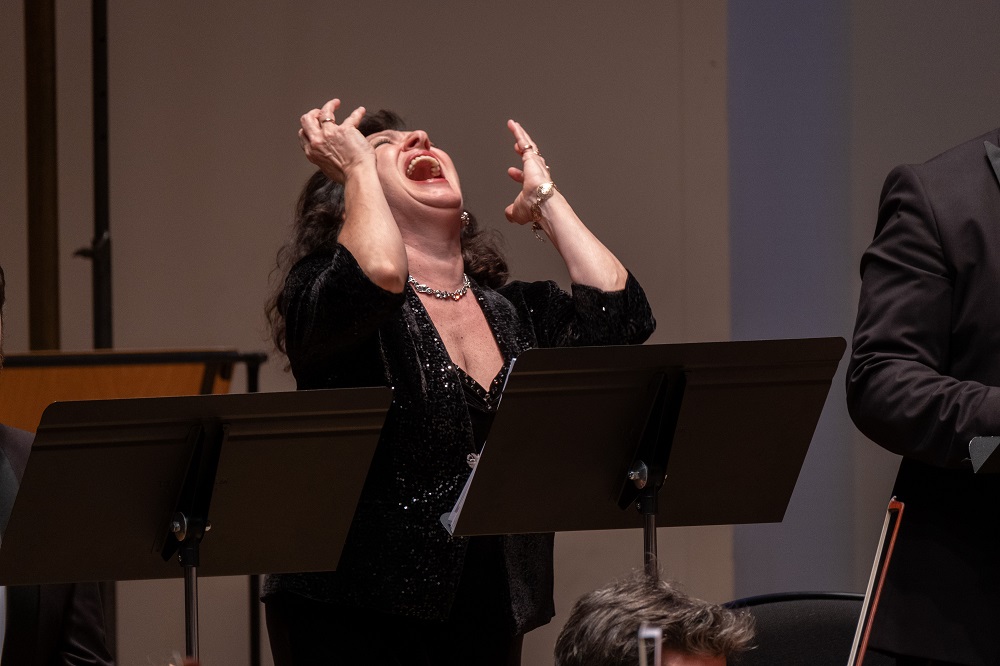Zingari/Tosca Suite, Opera Rara, Rizzi, Cadogan Hall review - symphonic mastery and fluent hokum | reviews, news & interviews
Zingari/Tosca Suite, Opera Rara, Rizzi, Cadogan Hall review - symphonic mastery and fluent hokum
Zingari/Tosca Suite, Opera Rara, Rizzi, Cadogan Hall review - symphonic mastery and fluent hokum
Top singers and orchestra deliver the goods in Leoncavallo's fast-moving melodrama

Two major composers took Pushkin’s narrative poem The Gypsies as the subject for two very different operas. The 19 year old Rachmaninov in 1892 had inspiration but not much sense of dramatic continuity; Leoncavallo in 1912, 20 years on from his deserved smash hit Pagliacci, managed the flow but not the inspiration.
Quality was assured before the first note of the evening. Carlo Rizzi, here conducting the Royal Philharmonic Orchestra, stands alongside Antonio Pappano as quite simply the most idiomatic interpreter of Italian opera. And what he offered up before Zingari was no opportunistic small beer. He’d spent lockdown making orchestral suites, more properly symphonic poems, from Puccini’s Tosca and Madama Butterfly. Too often Puccini as one of the great orchestrators passes people by in the opera house, but you couldn’t ignore the skill and kaleidoscopic variety here.  Rizzi’s selection, not chronological, gave us in effect four conjoined symphonic movements: an opener focusing on the horror of police chief Scarpia’s sadistic power, a slow movement leaping to a bit of the Act Three duet before showing the instrumental beauties of "Vissi d’arte", culminating in the firing-squad march only to cut straight to a scherzo made up of the Sacristan’s sprightly music and the church choir stopped dead in their frou-frouing tracks by Scarpia’s arrival. It’s always a bit disappointing to me that the opera ends with an orchestral belt-out of hero Cavaradossi’s “E lucevan le stelle”, but that was vindicated here by having the clarinet solo introducing it in the Act Three prelude as part of the finale. Throughout all this, one could marvel at Rizzi’s nimbleness, the dynamic range he drew from the RPO, the vindication of Puccini the symphonist.
Rizzi’s selection, not chronological, gave us in effect four conjoined symphonic movements: an opener focusing on the horror of police chief Scarpia’s sadistic power, a slow movement leaping to a bit of the Act Three duet before showing the instrumental beauties of "Vissi d’arte", culminating in the firing-squad march only to cut straight to a scherzo made up of the Sacristan’s sprightly music and the church choir stopped dead in their frou-frouing tracks by Scarpia’s arrival. It’s always a bit disappointing to me that the opera ends with an orchestral belt-out of hero Cavaradossi’s “E lucevan le stelle”, but that was vindicated here by having the clarinet solo introducing it in the Act Three prelude as part of the finale. Throughout all this, one could marvel at Rizzi’s nimbleness, the dynamic range he drew from the RPO, the vindication of Puccini the symphonist.
For the Leoncavallo, you had to take the Italianate ease for granted. The brushstrokes are broad as this lurid entertainment composed to follow dancing animals and acrobats at London’s Hippodrome Theatre draws on a whole armoury of cliched exotica: polonaise and mazurka rhythms (for a gypsy chorus!), Hungarian csárdás mode, the supernatural whole tone scale, the augmented seconds of the oriental scale for hoochy-koochiness, even a habanera to follow Carmen’s. Which is apt, because Prosper Mérimée, on whose novella Bizet and his collaborators based their opera, translated the original Pushkin into French.
Not that there’s a lot left of the original tale, in which urban malcontent Aleko finds freedom among rovers – and love with Zemfira, but not for long; her affairs, like Carmen’s, only last six months. To give us a not-quite-conventional soprano-tenor-baritone triangle, Leoncavallo’s plot jettisons the young gypsy with whom Zemfira takes up at a late stage in favour of Tamar, the rough diamond whom the Leoncavallo heroine (called Fleana) first rejects and then takes up when she’s tired of the outsider, Prince Radu. Leoncavallo’s chief virtue in giving us two scenes in one hour is compactness, gliding from one short set-piece to another, and the contrasts are just about sufficient to hold the interest.  Mostly it’s opera by numbers, with a slightly higher level of memorable melody in the climactic duet for Fleana and Tamar. But all of it walks the walk, and for that four top-notch singers are necessary. It’s always a pleasure to listen to the artistry of that great and poised soprano Krasimira Stoyanova (pictured above). And security was there in Lukasz Goliński’s Old Man (the smallest of the four solo roles), full-voiced tenor Arsen Soghomonyan and authentic Italianate baritone Stephen Gaertner, stepping in for an indisposed Carlos Álvarez. That this American would do the brooding, powerful job to perfection wasn’t in doubt since he was outstanding in Opera Rara’s previous Leoncavallo venture, Zaza, a more interesting work.
Mostly it’s opera by numbers, with a slightly higher level of memorable melody in the climactic duet for Fleana and Tamar. But all of it walks the walk, and for that four top-notch singers are necessary. It’s always a pleasure to listen to the artistry of that great and poised soprano Krasimira Stoyanova (pictured above). And security was there in Lukasz Goliński’s Old Man (the smallest of the four solo roles), full-voiced tenor Arsen Soghomonyan and authentic Italianate baritone Stephen Gaertner, stepping in for an indisposed Carlos Álvarez. That this American would do the brooding, powerful job to perfection wasn’t in doubt since he was outstanding in Opera Rara’s previous Leoncavallo venture, Zaza, a more interesting work.
The professional Opera Rara chorus could have done with a bit more testosterone from the men, and sometimes you got the impression from the soloists that this was a recording-studio venture (it will, of course, be released on the Opera Rara label). But it was never less than pleasurable, even if the final conflagration – no stabbing for this outcast, just arson – provoked the giggles. Bravissimi, Rizzi and company. Just one thing - the Cadogan Hall really needs to toughen up its act on mask-wearing; not to do so right now looks and feels bad.
Add comment
The future of Arts Journalism
You can stop theartsdesk.com closing!
We urgently need financing to survive. Our fundraising drive has thus far raised £49,000 but we need to reach £100,000 or we will be forced to close. Please contribute here: https://gofund.me/c3f6033d
And if you can forward this information to anyone who might assist, we’d be grateful.

Subscribe to theartsdesk.com
Thank you for continuing to read our work on theartsdesk.com. For unlimited access to every article in its entirety, including our archive of more than 15,000 pieces, we're asking for £5 per month or £40 per year. We feel it's a very good deal, and hope you do too.
To take a subscription now simply click here.
And if you're looking for that extra gift for a friend or family member, why not treat them to a theartsdesk.com gift subscription?
more Opera
 La bohème, Opera North review - still young at 32
Love and separation, ecstasy and heartbreak, in masterfully updated Puccini
La bohème, Opera North review - still young at 32
Love and separation, ecstasy and heartbreak, in masterfully updated Puccini
 Albert Herring, English National Opera review - a great comedy with depths fully realised
Britten’s delight was never made for the Coliseum, but it works on its first outing there
Albert Herring, English National Opera review - a great comedy with depths fully realised
Britten’s delight was never made for the Coliseum, but it works on its first outing there
 Carmen, English National Opera review - not quite dangerous
Hopes for Niamh O’Sullivan only partly fulfilled, though much good singing throughout
Carmen, English National Opera review - not quite dangerous
Hopes for Niamh O’Sullivan only partly fulfilled, though much good singing throughout
 Giustino, Linbury Theatre review - a stylish account of a slight opera
Gods, mortals and monsters do battle in Handel's charming drama
Giustino, Linbury Theatre review - a stylish account of a slight opera
Gods, mortals and monsters do battle in Handel's charming drama
 Susanna, Opera North review - hybrid staging of a Handel oratorio
Dance and signing complement outstanding singing in a story of virtue rewarded
Susanna, Opera North review - hybrid staging of a Handel oratorio
Dance and signing complement outstanding singing in a story of virtue rewarded
 Ariodante, Opéra Garnier, Paris review - a blast of Baroque beauty
A near-perfect night at the opera
Ariodante, Opéra Garnier, Paris review - a blast of Baroque beauty
A near-perfect night at the opera
 Cinderella/La Cenerentola, English National Opera review - the truth behind the tinsel
Appealing performances cut through hyperactive stagecraft
Cinderella/La Cenerentola, English National Opera review - the truth behind the tinsel
Appealing performances cut through hyperactive stagecraft
 Tosca, Royal Opera review - Ailyn Pérez steps in as the most vivid of divas
Jakub Hrůša’s multicoloured Puccini last night found a soprano to match
Tosca, Royal Opera review - Ailyn Pérez steps in as the most vivid of divas
Jakub Hrůša’s multicoloured Puccini last night found a soprano to match
 Tosca, Welsh National Opera review - a great company reduced to brilliance
The old warhorse made special by the basics
Tosca, Welsh National Opera review - a great company reduced to brilliance
The old warhorse made special by the basics
 BBC Proms: The Marriage of Figaro, Glyndebourne Festival review - merriment and menace
Strong Proms transfer for a robust and affecting show
BBC Proms: The Marriage of Figaro, Glyndebourne Festival review - merriment and menace
Strong Proms transfer for a robust and affecting show
 BBC Proms: Suor Angelica, LSO, Pappano review - earthly passion, heavenly grief
A Sister to remember blesses Puccini's convent tragedy
BBC Proms: Suor Angelica, LSO, Pappano review - earthly passion, heavenly grief
A Sister to remember blesses Puccini's convent tragedy
 Orpheus and Eurydice, Opera Queensland/SCO, Edinburgh International Festival 2025 review - dazzling, but distracting
Eye-popping acrobatics don’t always assist in Gluck’s quest for operatic truth
Orpheus and Eurydice, Opera Queensland/SCO, Edinburgh International Festival 2025 review - dazzling, but distracting
Eye-popping acrobatics don’t always assist in Gluck’s quest for operatic truth

Comments
An interesting evening, to
It was a wonderful evening
Also surprised that the
Also surprised that the players were all bunched together and strings sharing stands. One member wearing a mask. Did they all have tests beforehand? As for the hall, simply a request to keep masks on during the performance as part of the amplified announcement just before the start would have done.
Yes, players in the orchestra
Good to know. Thanks. It's
Good to know. Thanks. It's still the Cadogan Hall's problem that the audience aren't asked before the concert to wear masks while seated (or, indeed, moving around the foyers).
I don’t approve of the
What rules? Do you mean
What rules? Do you mean laissez-faire with regard to masks?
Yes. You wear a mask if you
They are completely entitled
They are completely entitled to do so for the safety of their entire audience, staff and performers. Laissez-faire is no ruling at all.
I thought this was The Arts